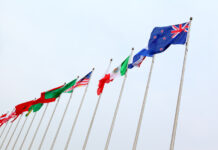NewsroomPlus.com Contributed by Save the Children
No more than 1.5 degrees of warming. This is what governments and leaders across the Pacific Island Nations are calling for in the lead up to the climate summit in Paris later this year. Today marks the International Day for Disaster Risk Reduction, and there has been no better time to call for action to reduce the risk posed by both the slow on-set of climate change and for as a growing number of emergencies.
 We have seen recently the capital city of Choiseul Province in the Solomon Islands, planning to relocate its entire population in response to climate change. Predictions that Kiribati, the Maldives, the Marshall Islands could all vanish at 2 degrees of warming along with many other coastal zones across the Pacific – an estimated 150-300 million people could be displaced by 2050
So what will an era of climate refugees look like?
Global warming will see an increase in the frequency and intensity of weather events across the Pacific, rising sea levels, ocean acidification, an increase in temperatures, precipitation, and salt inundation which will threaten food production and security. The Pacific will face an ever-higher risk of cyclones, storm surges, drought and floods. The current experience of El Nino is causing severe drought in Papua New Guinea, Tonga, and in northern and western divisions in Fiji. Vanuatu and Samoa are currently under threat of drought.
The theme this year for International Day for Disaster Risk Reduction is traditional knowledge. In the past, people had ways and means of preparing for disaster through their use of traditional knowledge. This knowledge was passed from one generation to the next by way of story-telling and verbal communication.
They knew when to go fishing by observing the stars and their positions, from tides and waves, from wind and from the moon. A bright full moon with and outer circles tells Routuman fishermen what fish to catch. The formation of beehives on soil surface would foretell the coming of a cyclone and warn people to prepare well in advance.
Scientists are now acknowledging the importance of traditional knowledge in promoting sustainability and preparing for natural disasters. But they recognise that we cannot solely depend on it. Together, traditional knowledge AND climate science can help us predict and prepare for more natural disasters.
Professor Dr Guy McPherson leaves us with a poignant remark “if you really think the environment is less important than the economy, try holding your breath while you count your money.”
We have seen recently the capital city of Choiseul Province in the Solomon Islands, planning to relocate its entire population in response to climate change. Predictions that Kiribati, the Maldives, the Marshall Islands could all vanish at 2 degrees of warming along with many other coastal zones across the Pacific – an estimated 150-300 million people could be displaced by 2050
So what will an era of climate refugees look like?
Global warming will see an increase in the frequency and intensity of weather events across the Pacific, rising sea levels, ocean acidification, an increase in temperatures, precipitation, and salt inundation which will threaten food production and security. The Pacific will face an ever-higher risk of cyclones, storm surges, drought and floods. The current experience of El Nino is causing severe drought in Papua New Guinea, Tonga, and in northern and western divisions in Fiji. Vanuatu and Samoa are currently under threat of drought.
The theme this year for International Day for Disaster Risk Reduction is traditional knowledge. In the past, people had ways and means of preparing for disaster through their use of traditional knowledge. This knowledge was passed from one generation to the next by way of story-telling and verbal communication.
They knew when to go fishing by observing the stars and their positions, from tides and waves, from wind and from the moon. A bright full moon with and outer circles tells Routuman fishermen what fish to catch. The formation of beehives on soil surface would foretell the coming of a cyclone and warn people to prepare well in advance.
Scientists are now acknowledging the importance of traditional knowledge in promoting sustainability and preparing for natural disasters. But they recognise that we cannot solely depend on it. Together, traditional knowledge AND climate science can help us predict and prepare for more natural disasters.
Professor Dr Guy McPherson leaves us with a poignant remark “if you really think the environment is less important than the economy, try holding your breath while you count your money.”
Friday 9th of February 2024 07:20:43 AM
© Copyright 2023 EveningReport.nz and Multimedia Investments Ltd. All rights reserved.









